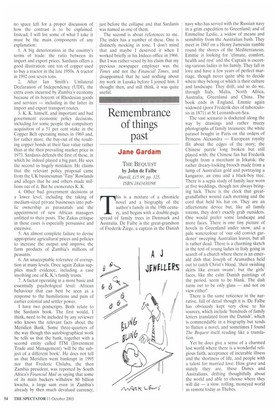Remembrance of things past
Jane Gardam
THE BEQUEST by John de Falbe Harvill, £15.99, pp. 325, ISBN 1843430398 This is a mixture of a chronicle novel and a biography of the author's family in the 19th century, and begins with a double-page spread of family trees in Denmark and Australia. De Falbe is the great-grandson of Frederik Ziege, a captain in the Danish
navy who has served with the Russian navy in a grim expedition to Greenland; and of Emmeline Leslie, a widow of means and sensibility from the Australian bush. They meet in 1865 on a Henry Jamesian ramble round the shores of the Mediterranean. Emmie is looking for 'climate, comfort, health and rest' and the Captain is escorting various ladies in his family. They fall in love and have a few years of perfect marriage, though never quite able to decide where they belong or which is their culture and landscape. They drift, and so do we, through Italy, Malta, North Africa, Australia, Greenland and China. The book ends in England, Emmie again widowed (poor Frederik dies of tuberculosis in 1871) at St Leonards-on-Sea.
The vast scenario is docketed along the way by drawings and rather muzzy photographs of family treasures: the white parasol bought in Paris on the orders of Princess Alexandra — European royalty flit about the edges of the story; the Chinese puzzle long broken but still played with; the Chinese fan hat Frederik bought from a merchant in Irkutsk: the rather dreary-looking brooch made from a lump of Australian gold and portraying a kangaroo, an emu and a black-boy tree. There is a sepia study of family lace worn at five weddings, though not always bringing luck. There is the clock that greatgrandfather wound each morning and the cord that held his hat on. They are an affectionate device but, like all family totems, they don't exactly grab outsiders. One would prefer some landscape and more faces. There is one tiny picture of hovels in Greenland under snow, and a pale watercolour of 'our old convict gardener' sweeping Australian leaves, but all is rather dead. There is a charming sketch in the text of young ladies in Italy going in search of a church where there is an emerald dish that Joseph of Aramathea held Out to catch Christ's blood, 'their swishing skirts like errant swans'; but the girls' faces, like the calm Danish paintings of the period, seem to be blank. The dish turns out to be only glass — and not on view either!
There is the same reticence in the narrative, full of detail though it is. De Falbe has obviously kept very close to his sources, which include 'hundreds of family letters translated from the Danish', which is commendable in a biography but tends to flatten a novel, and sometimes I found The Bequest itself reading like a translation.
Yet he does give a sense of a charmed lost world where there is a wonderful religious faith, acceptance of incurable illness and the shortness of life, and people with a talent for married love. How grave and stately they are. these Danes and Australians, drifting thoughtfully about the world and able to choose where they will die — a slow, rolling, moneyed world as remote today as Thebes_


















































































 Previous page
Previous page